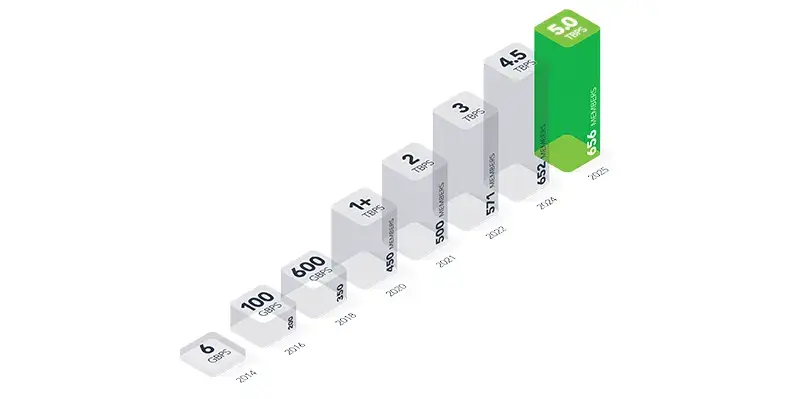
NAPAfrica reaches 5Tbps, reinforcing its role as Africa’s leading IXP, improving local traffic, reducing costs, and boosting performance. (
NAPAfrica, backed by its robust peering community, has achieved a significant milestone—hitting five terabits per second (Tbps) of traffic
As Africa’s fastest-growing Internet Exchange Point (IXP) and one of the top ten globally in terms of total traffic volume, NAPAfrica continues to solidify its position as the leading hub for peering and interconnection on the continent.
With more than 655 networks peering at its exchange points, NAPAfrica plays a vital role in keeping African internet traffic local, reducing operational costs, and improving overall network performance.
NAPAfrica’s Key Traffic Milestones
- 2016: Traffic reached 100Gbps
- 2018: Traffic hit 500Gbps
- 2021: Traffic surged to 2Tbps
- 2023: Traffic surpassed 4Tbps
- February 2025: Traffic climbed to 5Tbps
Current NAPAfrica Statistics
- Physical connected ports: 2,244
- Total connected capacity: 41.5Tbits
Top ten factors driving NAPAfrica’s growth
1. Strategic locations in South Africa
NAPAfrica operates in Johannesburg, Cape Town, and Durban—three key hubs for internet traffic in Africa. These locations serve as essential interconnection points for regional and global networks.
2. Teraco Data Centres
NAPAfrica is hosted within Teraco data centres, the largest carrier- and vendor-neutral data centre operator in Africa. This setup provides direct interconnection with over 655 networks, including ISPs, CDNs, cloud providers, and enterprises, ensuring a seamless and cost-effective peering experience.
3. Presence of leading content and cloud providers
The exchange attracts major global tech companies such as Akamai, Amazon, Cloudflare, Google, Meta, Microsoft, and Netflix, enabling direct content delivery and cloud access within Africa.
To further enhance connectivity, Teraco and NAPAfrica have invested in additional cache servers, addressing regional content needs. For instance, Netflix Open Connect is now hosted in Cape Town and Durban, reducing data travel distances, improving load times, and making the platform even more appealing to new peers.
4. Free peering and cost efficiency
Unlike many international IXPs that charge for port access, NAPAfrica offers free peering. This allows ISPs, content providers, and enterprises to reduce transit costs while enhancing network performance.
5. Expansion of the peering community
Over the past year, NAPAfrica has welcomed more than 40 new peers, including leading companies like Mimecast, Fortinet, and Tencent. This growth has strengthened the peering ecosystem, increasing the efficiency of traffic exchange.
6. Introduction of 400Gbps interconnection options
In a first for Africa, NAPAfrica now offers 400Gbps interconnects to accommodate the increasing bandwidth needs of content and cloud service providers.
7. Growth of local and regional networks
Traditionally, much of Africa’s internet traffic was routed through Europe, leading to higher latency and costs. NAPAfrica has helped keep this traffic within Africa, enhancing performance for ISPs, mobile operators, and businesses while contributing to a more self-sustaining internet ecosystem on the continent.
8. Strengthened subsea cable connectivity
South Africa’s status as a key landing point for subsea cables—including 2Africa, ACE, EASSy, Equiano, METISS, SAT3/SAFE, Seacom, and WACS—has significantly boosted international connectivity. Many networks across Southern, East, and West Africa peer at NAPAfrica to efficiently access global content.
9. Surge in mobile and broadband internet usage
With rapid growth in mobile internet and fibre broadband adoption across Africa, ISPs and mobile operators increasingly depend on NAPAfrica to support rising demand for video streaming, gaming, and cloud-based services.
10. Enhanced Network Visibility and Performance Optimization
NAPAfrica’s integration of the Kentik Network Observability platform gives peering members valuable insights into network performance. This allows them to optimise traffic flows, detect potential issues, and enhance overall efficiency.
Driving Africa’s digital future
As Africa’s digital ecosystem continues to expand, NAPAfrica remains at the forefront of connectivity, providing critical infrastructure to power the continent’s digital transformation. With ongoing growth and development, the exchange is set to play an even greater role in shaping Africa’s internet economy.
Also read: Powering up esports with new alliancePowering up esports with new alliance

























